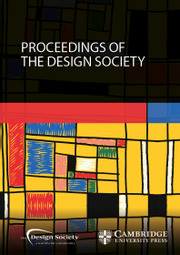Article contents
A QUALITATIVE INVESTIGATION OF STUDENTS’ DESIGN EXPERIENCES IN A WORK-INTEGRATED LEARNING SETTING
Published online by Cambridge University Press: 19 June 2023
Abstract
Work-integrated learning (WIL) – a pedagogy that integrates academic studies with workplace experiences – presents an excellent opportunity for students to “deliberately practice” their design skills. To date there has been little investigation into the effect(s) of WIL experiences on developing novice designers’ design skills.
We performed a series of longitudinal interview case studies following three engineering students through the course of a 4-month work term. Interviews were semi-structured to gather rich contextual descriptions of participant experiences designing in WIL settings. Transcripts were analysed using an iterative thematic analysis approach.
Results indicate specific areas where WIL helps develop novice designers’ engineering design skills and mindsets beyond their early experiences in the engineering classroom. These include their experiences interacting with clients/users, the importance of project transition considerations, resource coordination, teamwork/collaboration, and the design process. We discuss how the structure of design tasks and their environment differ from the classroom experience, highlighting how WIL can supplement traditional design education.
- Type
- Article
- Information
- Creative Commons
- This is an Open Access article, distributed under the terms of the Creative Commons Attribution-NonCommercial-NoDerivatives licence (http://creativecommons.org/licenses/by-nc-nd/4.0/), which permits non-commercial re-use, distribution, and reproduction in any medium, provided the original work is unaltered and is properly cited. The written permission of Cambridge University Press must be obtained for commercial re-use or in order to create a derivative work.
- Copyright
- The Author(s), 2023. Published by Cambridge University Press
References
- 1
- Cited by


